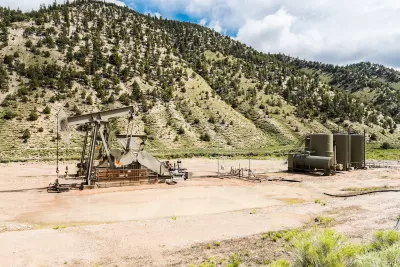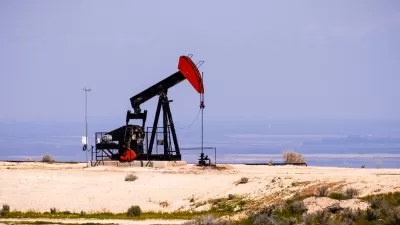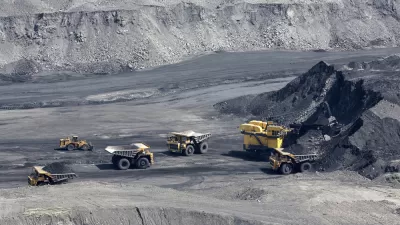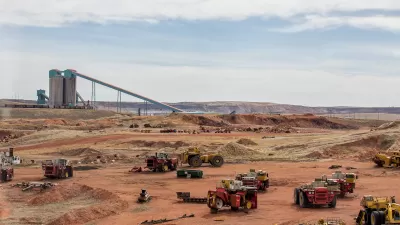The Surface Transportation Board's approval in 2021 of a proposed 85-mile Uinta Basin Railway in Utah that would have enabled increased extraction of the world's largest source of oil shale was partially vacated by a federal appeals court last month.

Back in June 2014, Planetizen posted: "Oil Shale (not Shale Oil) and Oil Sands Projects Underway in Utah," and six months earlier, "Utah Oil Shale Plans—'First Commercial Production In Decades.'" A lot has happened since then to extract this unusual fossil fuel.
Most significantly, on December 15, 2021, the Surface Transportation Board (STB), an independent federal regulatory agency that oversees freight rail, granted final approval "for an exemption sought by the Seven County Infrastructure Coalition (Coalition) to construct and operate a new line of railroad in Utah." An 'exemption' refers to a finding by the board's Office of Environmental Analysis (OEA).
On May 29, 2020, the Coalition filed a petition for exemption for authorization to construct and operate an approximately 85-mile rail line connecting two termini in the Uinta Basin near South Myton Bench [Duchesne County], Utah, and Leland Bench, Utah, to the national rail network at Kyune, Utah.
Reporting on the STB's approval at that time, Progressive Railroading wrote on December 16, 2021:
On Aug. 6, the board’s OEA — in cooperation with stakeholders, tribes and federal, state and local agencies — completed an environmental impact statement that identified the Whitmore Park Alternative as the preferred alternative because it would avoid or minimize major environmental impacts.
The STB’s decision is effective Jan. 14, 2022.
Uinta Basin Railway LLC will finance, construct and operate the railway.
Attempts to halt railway construction
Jason Blevins of The Colorado Sun has been covering the rail proposal since July 2020 "with a focus on the operator's request that the STB expedite approval for a proposal to open the long-dormant Tennessee Pass rail line," last used in August 1997, according to an email dated Aug. 25. While the STB rejected that proposal on March 25, 2021, Bevins continued his coverage of Uinta Basin Railway.
"A consortium of environmental groups earlier this year filed objections to the Forest Service’s draft plan to allow the new railroad to traverse about 12 miles of roadless area, with new bridges and tunnels in the Ashley National Forest," reported Blevins on July 11, 2022.
Last week, the agency dismissed those objections [pdf], ruling that the yearslong Environmental Impact Statement conducted by the federal Surface Transportation Board, which approved the new railroad in December 2021, adequately addressed environmental concerns.
Undeterred, Eagle County, Colorado, and the environmental and other non-profit groups filed briefs on August 18, 2022, "asking the U.S. Court of Appeals in Washington, D.C., to overturn the transportation’s board approval, noting the board’s 'uninformed decision-making' in its environmental review of the project and 'increased risk of environmental harm' from increased oil production and processing," reported Bevins on Sept. 7, 2022.
The decision set the stage for 65,000 to 350,000 barrels of Uinta Basin waxy crude to roll through Colorado every day in 100-tanker-long trains, stretching 10,000 feet, as they cover a route running mostly along the Colorado River.
“The Surface Transportation Board’s failure to evaluate the impact of new traffic on the Tennessee Pass Line harms Eagle County’s interests in and ability to protect the environment and communities of Eagle County,” wrote Eagle County Manager Jeff Shroll.
[Also on Eagle County in Planetizen: "Colorado Mountain Communities Line Up to Oppose Statewide Zoning Reforms," April 6, 2023.]
A big win for Eagle County and environmental allies
Exactly a year to the day later on August 18, 2022, a "three-judge panel of the U.S. Court of Appeals for the District of Columbia partially vacated the STB’s decision [of Dec. 15, 2021], finding the board didn’t adequately assess potential environmental harms and wildfire risks that could result from large volumes of crude oil that would be shipped on the line through Colorado on their way to Gulf Coast refineries," reported Progressive Railroading in the source article.
Issued by Judge Robert Wilkins, the ruling [pdf] grants in part a petition filed by Eagle County in Colorado against the STB’s approval of the railway’s construction, and the environmental impact statement supporting the approval.
Eagle County was joined by five environmental groups in suing to block the project, which is backed by a public-private partnership between Utah county governments and industry, Colorado News Online reported.
“When Congress approved the Energy Policy Act of 2005, which became the incentive to exploit the unconventional fuels of the Colorado River Basin, our hope was that this very bad energy policy might incite a popular movement to address and counter the impacts of global warming,” said John Weisheit, conservation director for Living Rivers in Moab, Utah, in a press release by the Center for Biological Diversity.
“Yes, we need to thank the judges for making the right decision today, but this brighter day belongs to the climate justice movement.”
Woke environmentalism
As with many forms of energy extraction, the appeals court decision split along the familiar lines of economics vs. environment. Sen. Mike Lee, the senior U.S. Senator from Utah, captured that sentiment in a public statement reported by Kristin Forbis of the Uinta Basin's hometown online newspaper, BasinNow.com, on August 23:
“This blow against the Uinta Basin project represents a missed opportunity for our communities to thrive,” stated Senator Lee. “The National Environmental Policy Act (NEPA) and the accompanying Environmental Impact Statement (EIS) for the project were both thorough and exhaustive in their evaluations, so this decision is a needless setback for Utah.
The Uinta Basin Railway is not just about American energy: it’s about jobs, economic growth, and the prosperity of our great state. It is deeply concerning to see decisions that appear more influenced by ‘woke environmentalism’ rather than grounded, data-driven evaluations.
Next steps for Uinta Basin Railway
"So what now?" asked Blevins of The Colorado Sun on August 25.The appeals court ordered the federal transportation board to re-do its two-year, 1,700-page Environmental Impact Statement.
The Seven County Infrastructure Coalition that is proposing the nearly $3 billion railway as an economic engine for rural Utah said in a Facebook post that it remains committed to the project and that the federal review “contains appropriate and thorough analysis” of the concerns described in the federal appeals court ruling. Emails to board members were not returned.
Additional reading:
- The Colorado Sun: Federal appeals court derails Uinta Basin Railway plan to send billions more gallons of Utah crude through Colorado, August 18, 2023
- RealVail.com: U.S. Court of Appeals vacates federal approval of Uinta Basin Railway project, August 18, 2023
- CommonDreams: US Appeals Court Halts 'Climate Bomb' Oil Rail Project Over Environmental Concerns, August 18, 2023
Related in Planetizen:
- Oil Shale (not Shale Oil) and Oil Sands Projects Underway in Utah, June 18, 2014
- Utah Oil Shale Plans—'First Commercial Production In Decades,' January 26, 2014
Hat tips to Tim Sevener and AASHTO DTU, August 22.
FULL STORY: Federal court pauses Uinta crude-by-rail line construction

Study: Maui’s Plan to Convert Vacation Rentals to Long-Term Housing Could Cause Nearly $1 Billion Economic Loss
The plan would reduce visitor accommodation by 25,% resulting in 1,900 jobs lost.

North Texas Transit Leaders Tout Benefits of TOD for Growing Region
At a summit focused on transit-oriented development, policymakers discussed how North Texas’ expanded light rail system can serve as a tool for economic growth.

Using Old Oil and Gas Wells for Green Energy Storage
Penn State researchers have found that repurposing abandoned oil and gas wells for geothermal-assisted compressed-air energy storage can boost efficiency, reduce environmental risks, and support clean energy and job transitions.

Private Donations Propel Early Restoration of Palisades Playground
Los Angeles has secured over $1.3 million in private funding to restore the Pacific Palisades playground months ahead of schedule, creating a modern, accessible space that supports community healing after recent wildfires.

From Blight to Benefit: Early Results From California’s Equitable Cleanup Program
The Equitable Community Revitalization Grant (ECRG) program is reshaping brownfield redevelopment by prioritizing projects in low-income and environmental justice communities, emphasizing equity, transparency, and community benefits.

Planting Relief: Tackling Las Vegas Heat One Tree at a Time
Nevada Plants, a Las Vegas-based nonprofit, is combating the city’s extreme urban heat by giving away trees to residents in underserved neighborhoods, promoting shade, sustainability, and community health.
Urban Design for Planners 1: Software Tools
This six-course series explores essential urban design concepts using open source software and equips planners with the tools they need to participate fully in the urban design process.
Planning for Universal Design
Learn the tools for implementing Universal Design in planning regulations.
Ascent Environmental
Borough of Carlisle
Institute for Housing and Urban Development Studies (IHS)
City of Grandview
Harvard GSD Executive Education
Toledo-Lucas County Plan Commissions
Salt Lake City
NYU Wagner Graduate School of Public Service





























